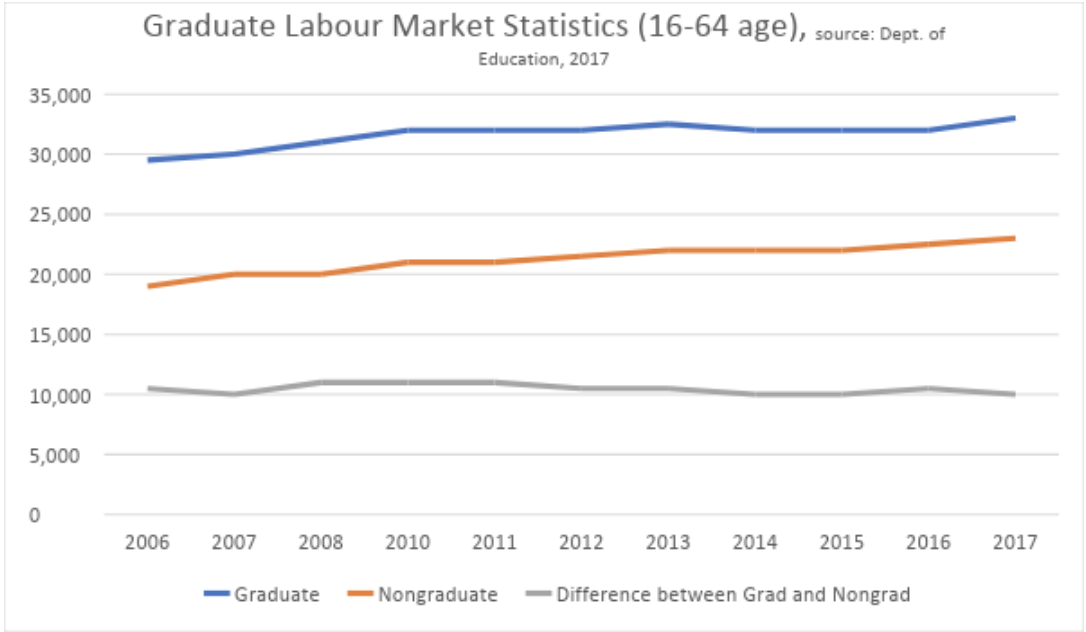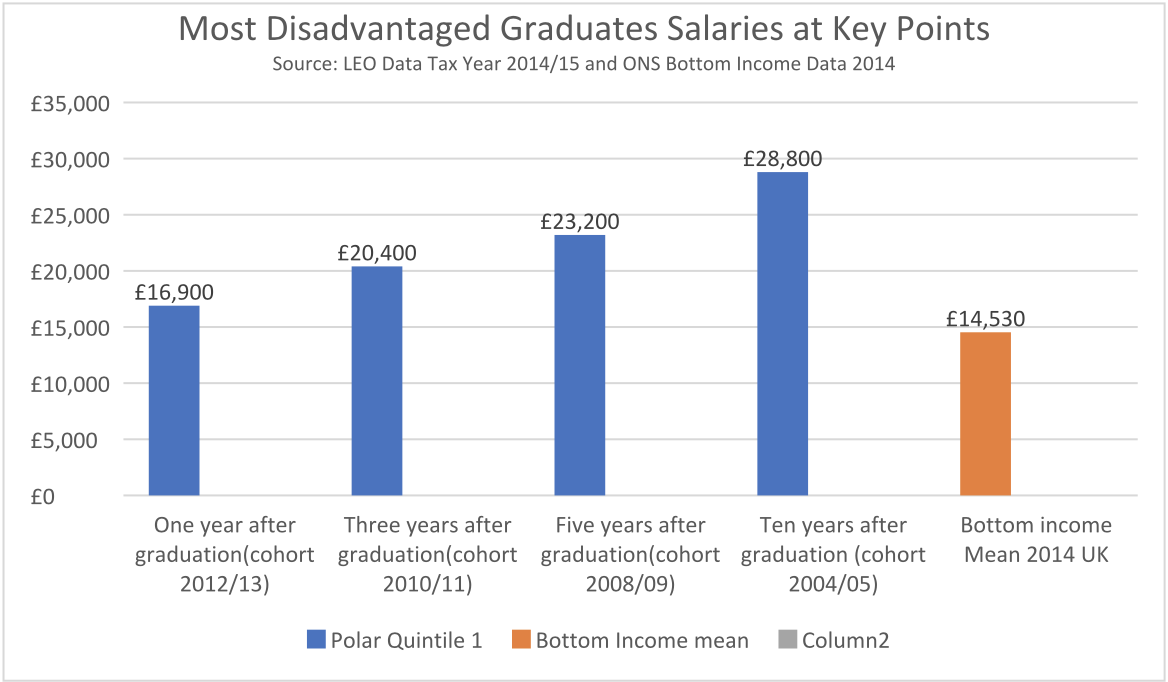The rising tuition fees and ongoing marketisation of the sector has given rise to a debate about the value of higher education.
Most authors will cite the fact that there is a wage premium for those who acquire a bachelors degree or higher. While few would disagree that a more educated population is beneficial to society as a whole, there are ongoing disparities as to who gets educated and where. Greater inclusion in an ever-expanding HE system is hailed as a virtue while simultaneously condemned as a curse. This conflict leaves little room to explore the socio-economic stratification present between higher education institutions and between these institutions and wider society.
First, as more individuals acquire degrees, we would expect greater income equality over time than an elite system where only a few benefit from their education.
Second, the proliferation of individuals with degrees will drive down the average real wage as the supply of graduates rises relative to demand. This could lead to an acute problem, including low graduate salaries and underemployment, if the structure of the economy does not align with the areas in which the population is being upskilled. However, it is predicted that many more jobs in the future will require a bachelors degree as a minimum qualification mitigating the impact of the wage gap between degree programmes because most jobs may eventually require HE.
Third, the expansion of HE has led — and will continue to lead — to a quality divide that manifests itself in degrees from some institutions not being valued as highly in the marketplace as others. However, recent evidence from several studies in the US coupled with further analysis of UK data has led some to question whether the quality divide is as straightforward as has been speculated.
Wage premium
Since the expansion of HE in the UK from the 1960s onwards, we have witnessed the HE wage premium. The HE sector often uses the existence of the wage gap as the principal rationale for the continued expansion of the sector. Indeed, there has been much written on how a university degree is a positional good that is demanded by all strata in society for its return of upward socio-economic mobility through higher incomes.
The UK economy has been particularly good at absorbing graduates re-enforcing the wage premium argument. Richard Blendell, David A. Green and Wenchao Jin have argued that the reason the strength of the wage differential is a result of the fact the UK had relatively low levels of HE as technology started to permeate the economy two decades ago. The UK’s education revolution occurred at the same time as its technological transformation. This caused the wage gap between degree and non-degree holders to be sustained through the mid-2000s. This increase in the UK population with graduate qualifications (42 per cent) may help explain a slight improvement in income inequality since 2013, as measured by the Gini coefficient (37.6 in 2007/08 versus 35.4 in 2016/17).

Benefits for the wealthy
Despite the wage premium, there has not been significant change in the median salary of graduates over the past ten years – a decline in real income. At the same time, the opportunity cost of attending university has gone up. Since 2012, students have been taking on an increasing amount of debt to attend university.
The introduction of a student loan system where students can graduate with up to £50,000 debt and interest repayments (interest rates are 6.1% currently) can quickly erode any graduate premium. Blundell, Green and Jin’s study noted that the cohort born post-1980 were seeing a decline in the wage differential. They fear that the economy may not be changing fast enough to accommodate the increase in graduates.
In the US, recent studies reveal this drag on the graduate premium has caused a new wage gap. It’s not between graduates and non-graduates but an intergenerational one where millennials are finding it difficult to keep up with their parent’s earnings. Richard V. Reeves and Katherine Guyot note that only half of today’s 30 year-olds earn more than their parents. Raj Chetty showed in his work on the fading American dream that there is a significant positive correlation between the parents’ income and the decline in absolute mobility – the proportion of children who earn more than their parents – over the years. In fact, the richer the parents, the more significant the wage decline for their children.
Longstanding social inequalities
One of the fears of the Longitudinal Education Outcomes (LEO) dataset is that it will reinforce the notion that certain degrees or institutions do not provide an adequate return on students’ investments. The LEO dataset demonstrates variance in graduate salaries across institutions and courses. It re-enforces the notion that students who go to higher tariff institutions earn more, as do those who enter certain professions. Yet if look to the US we can see that it is those who are born into the lower income distributions who are continuing to reap the most from higher education. In fact, in the Chetty study, those born into the very bottom of the distribution are still highly likely to out-earn their parents.

If we explore the UK data, we see that this phenomenon is echoed here as well. The students from the most disadvantaged backgrounds can secure an income higher than the mean for the bottom quintile. Consequently, going to university is a good investment for them regardless of institution, but it can be an even better if they can get into a high tariff institution and a programme that has increasing market demand. UCAS revealed in its 2017 end-of-cycle report more disadvantaged students are attending higher tariff institutions than ever before – increasing by 7.4% since 2016.
We need to be cautious about attacking what could be the beginning of the equalisation of incomes within society because the wealthier participants are no longer seeing the extreme premiums that were possible in an era of elite HE.
What may be unfolding is a new socio-economic order wherein those from the most deprived backgrounds are able to outperform their parents due to participation in HE. We must remind ourselves that when women entered the labour market en masse, real wages went down in many professions but the economy and society has subsequently benefited greatly. We need to make sure we understand what we hope to achieve through higher education – and this, ideally, should be a more equitable society.













I missed this when it was first posted – very interesting indeed – thank you!